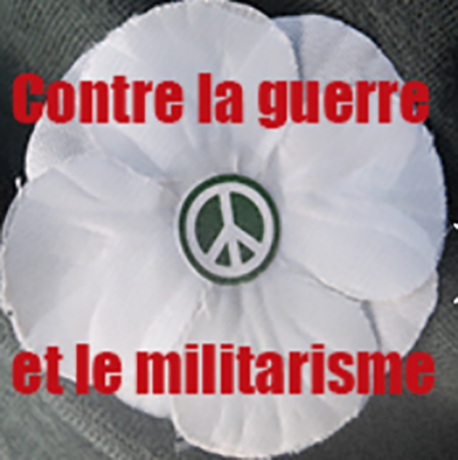Reports
You are here
Taking back Remembrance Day in Montreal

November 13, 2015
November 11 doesn’t offer much to remember for Quebec. The famous “Vandoos,” the all-francophone 22nd regiment, was formed as a way to end a rebellion against conscription after World War I—a rebellion that happened again in World War II.
And given that today Remembrance Day is used to glorify the fifteen-year long war on terror that has extended into the bombing of Iraq and Syria in the name of defeating ISIS—itself a creation of the war on terror—it is no more popular in Quebec today. A quarter of a million people on the streets of Quebec numerous times in 2003 kept Canada out of the last war in Iraq.
So it’s not surprising that the main Remembrance Day event in Montreal, including in 2015, takes place not at a city cenotaph, but at the campus of McGill—a key part of the former bastion of anglophone economic and political power in Quebec. It was there that the Canadian Forces performed a 21-gun salute with cannons this November 11.
But the Montreal coalition that paid a key role in mobilizing thousands from the community, workplaces and labour unions against war in Iraq held a protest across the street that same day.
Against war and austerity
Echec a la guerre brought out a hundred core supporters who attracted many passersby, and some who crossed the street from the official military display at McGill, to look at the banners and the large sheet inscribed with a peace sign and handwritten messages of peace. White poppies were being sold to raise money for the effort, and a banner announced that the white poppy is a symbol to remember all victims of war, not only military veterans.
Also on Remembrance Day, the massive and ongoing movement against austerity in Quebec continued without break. Nurses, who are part of the public sector Common Front although they can’t take part in legal strike actions, chained themselves to the office of Quebec Liberal Premier Couillard.
At McGill the night before, “Demilitarize McGill,” a coalition seeking divestment from military research, initiated by McGill support staff and students, held the first event of a series called #RememberThis. It was a reading from the recent anti-war play “Motherhouse” by Dave Fennario, which brings home the experience of war to a WWI munitions factory in the Montreal neighbourhood of Verdun—where working women faced war-profiteering, exploitation and violence on the homefront that goes unrecognized by the red poppy and traditional Remembrance Day ceremonies. The reading was performed by McGill theatre student Laura Orozco, and playwright Fennario fielded a Q and A afterwards. In his words, this kind of opposition to war is the best anti-capitalist weapon there is. It cuts to the heart of a system that feeds on profit and uses organized violence to defend it.
Let us remember the efforts of those who have given and continue to give their lives to a future free of war and profit.
And let us remember that while Justin Trudeau’s Liberals made their first post-election promise an end to Canada’s combat mission in Syria and Iraq, the day after Remembrance Day CF-18 bombers continued to unleash carnage from the skies. Justin, lest you forget, the people of English Canada and Quebec gave you a mandate to stop the bombing now. If you forget, it is our responsibility to ensure that you remember.
Section:









